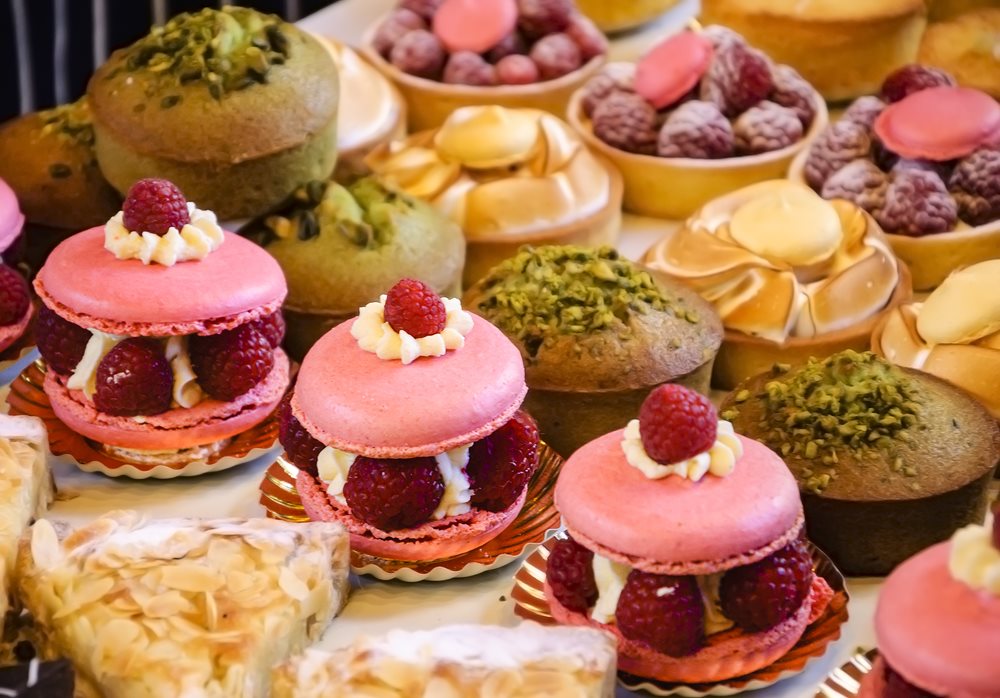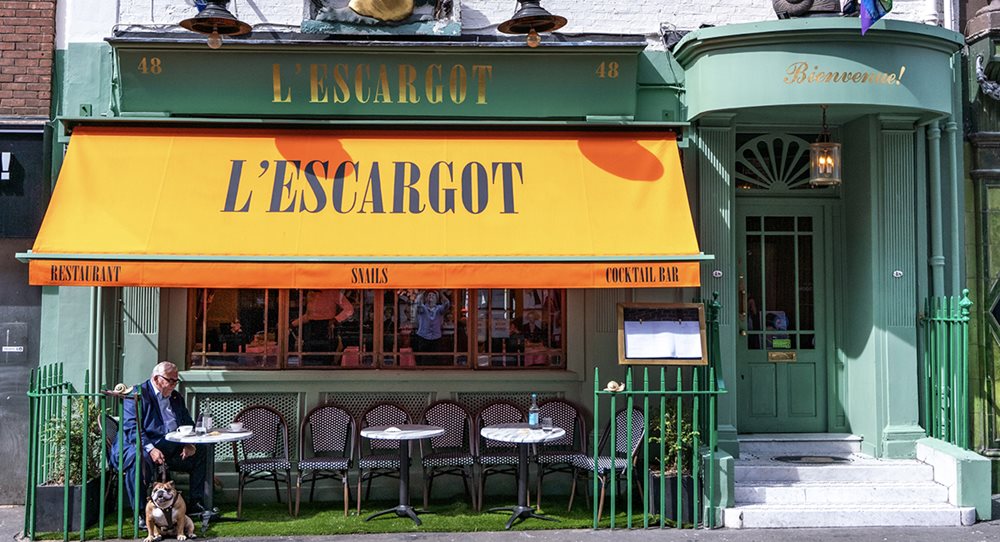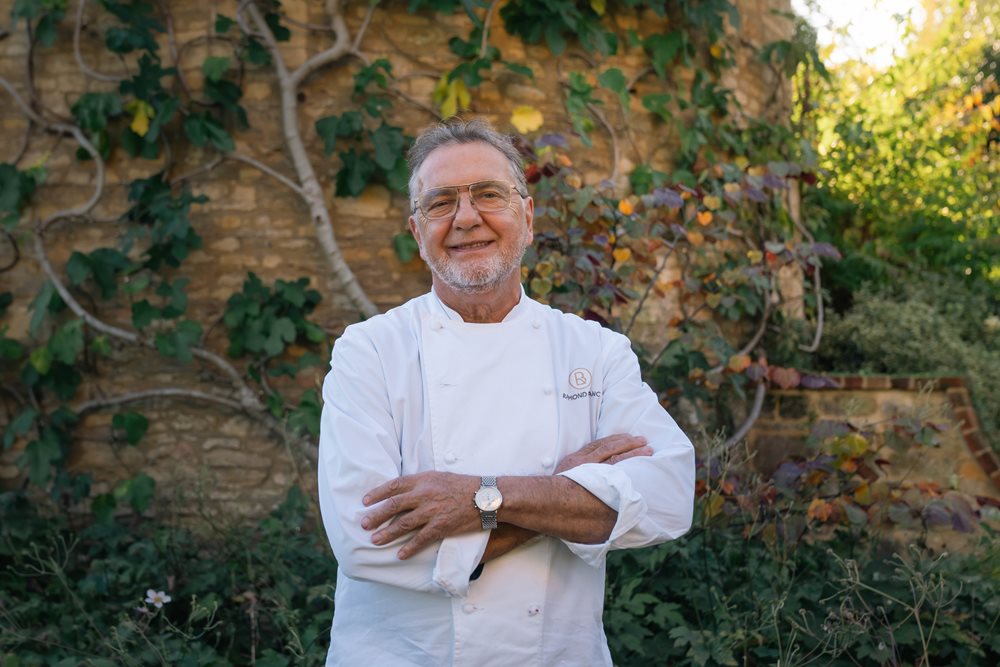French gastronomy has made an indelible mark in London’s culinary scene and its talented chefs continue to shape the UK’s appreciation of fine dining. While the influence of London’s French hospitality community remains strong, venues face growing competition and new challenges following Brexit, reports Leila Lamnaouer

French pastries on display at London’s famous Borough Market | Photo credit: Elena Dijour
London is a melting pot of global cultures and cuisine, but one nation has an enduring influence on the UK capital’s restaurant and café scene. French cuisine first made its way to England in the 17th century via the tables of the British aristocracy and has been considered the benchmark for fine dining ever since.
Much of that influence can be attributed to celebrity chef of the day Antonin Carême (1784-1833), who is credited with developing staples of classic French cuisine, such as velouté, béchamel, allemande and espagnole – and even the modern notion of the restaurant itself.
As celebrated Michelin-starred chef Raymond Blanc describes the arrival of Auguste Escoffier “the greatest French chef of his time,” at the Savoy in 1890 cemented the notoriety of French culinary traditions in London.
In 1896, Georges Gaudin opened Le Bienvenue in Soho, the first British restaurant to serve snails. It was followed 30 years later by L’Escargot, which retains the record for London’s longest-running French restaurant.
“The early 20th century marked the apogee of both the French language and savoir-faire around the world, particularly in England,” says Blanc.

L’Escargot opened its doors in 1927 and is London’s longest serving French restaurant | Photo credit: Courtesy of L’Escargot
Later, the Roux brothers, founders of Le Gavroche in 1967, were also key figures. Together, they trained over 700 chefs, including Marco Pierre White and Gordon Ramsay – both heavily influenced by French cuisine and the latter opening ‘Restaurant 1890’ at the Savoy in 2022 as a tribute to Pierre Escoffier.
Today, around 165,000 French nationals live in the UK, with around 85% residing in the Greater London area. Establishments such as Maison Bertaux, a patisserie that first opened in the late 19th century and serves artisan coffee, continue to fly the flag for London’s French influence. The same is true for Deli Robuchon, which operates three London venues, and Saint George Coffee, which has sites in Chelsea and Covent Garden.
“It’s tough to last and a real challenge not to go out of fashion”
Pascal Aussignac, Michelin-starred chef and restauranteur
So French is another contemporary French-inspired café founded by Cédric Badel in Mayfair and pays homage to Parisian café traditions.
“A French person will tell you a coffee break is the important moment of their day, whether it’s before work, after lunch or in the afternoon,” says Badel, explaining his vision to create a French enclave in the neighbourhood.
However, with nearly 15,000 restaurants vying for customers in London, today’s French operators must innovate to stand out from the cornucopia of cuisines available in the UK capital.
“It’s not enough to have ideas and money – you have to know what you’re doing,” says Pascal Aussignac, a Michelin-starred chef who owns five restaurants in London, including the Michelin-starred Club Gascon in Farringdon.
Even some of London’s greatest French restaurants have closed their doors, with Le Gavroche serving its last meals in January 2024 after 56 years in business. Galvin at Windows in Mayfair, Frenchie in Covent Garden and Buvette in Notting Hill have been other notable casualties.
These high-profile closures are undoubtedly in part due to supply issues caused by Brexit. In September 2024, a study by Aston University’s Centre for Business Prosperity revealed a 32% decline in food imports from the EU between 2021 and 2023.

Michelin-starred chef and restauranteur, Raymond Blanc | Photo credit: Imogen Candler
Following the loss of free movement after Brexit, some French restaurateurs have had no choice but to become visa sponsors to recruit chefs and staff, which has resulted in extra costs and administrative complications.
Aussignac says that Brexit has had a significant impact on his business, particularly with regards to imports of meat and his restaurant’s speciality from the southwest of France – foie gras. New certificate rules on cheese and poultry imports following Brexit mean many EU suppliers will no longer risk supplying the UK.
“There’s no point in continuing if foie gras isn’t available,” he explains. Between 1998 and 2024, the number of foie gras options on his menu fell from 12 to one, leaving him with no choice but to innovate. The chef created plant-based ‘faux gras’ and half of his menu is now vegetarian. “It’s tough to last and a real challenge to not go out of fashion,” Aussignac reflects.
In this context, innovation is the best response to these new challenges, which has seen a new trend emerge in London: ‘la cuisine bourgeoise française’, or ‘posh’ French cuisine.
One of the leaders of this trend is Marceline, which opened in Canary Wharf in August 2024. The restaurant is inspired by French-style brasseries and is run by Robert Aikens, who trained with the Roux brothers and serves French staples, such as steak tartare, escargots de Bourgogne and onion soup.
Other proponents of la cuisine bourgeoise française’ include François O’Neill and Ed Wyand’s Café François in Borough Market, Claude Bosi’s Joséphine in Fulham and Dave Strauss and Henry Harris’s Bouchon Racine in the City.
Raymond Blanc is certain that French cuisine must reinvent itself. The chef, who runs the Manoir aux Quat’Saisons and Brasseries Blanc, has lived in England for 50 years and has a 40-year career behind him.
“They want to eat simpler cuisine and know where products come from”
Raymond Blanc, Michelin-starred chef and restauranteur
Blanc is a fervent advocate of ‘nouvelle cuisine’, which he believes should be “lighter and more respectful of the environment, the seasons and local values”, as customers demand more responsible forms of gastronomy. “They want to eat simpler cuisine and know where products come from,” he says.
Blanc is also an advocate of French cuisine being enriched by other cultures and flavours and sees a new crop of young chefs in England ready to take over, who he believes will show the way forward.
However, others have chosen to preserve long-held traditions and at L’Escargot, customers come first and foremost to taste the dishes that have been on offer for almost a century.
“Initially, I told myself that we had to adapt. Adapting means offering new flavours, so I changed my mind,” says the restaurant’s CEO Brian Clivaz.
He believes that above all French cuisine is a highly constructed and precise method that takes time and feels he has no choice but to embrace his heritage – especially as his clientele strongly comprises French customers. “We want to be known as a bastion of French cuisine,” he says.
Despite the challenges that French cuisine has currency to face, Pascal Aussignac is also optimistic for the future and reminds us: “London is home to a vibrant and diverse population with a cosmopolitan appetite. French cuisine will continue to thrive in this city.”
This article was first published in Issue 22 of 5THWAVE magazine.
Subscribe to 5THWAVE to receive each edition in print and digitally or sign up to our newsletter and be the first to read the latest articles and updates on World Coffee Portal research.
